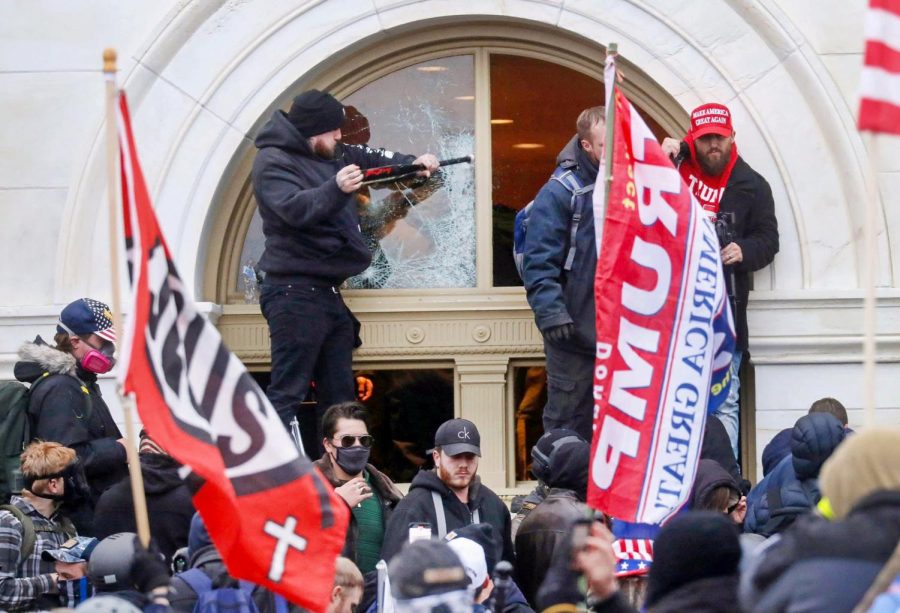Increased Political Polarization and Violence Threatens American Democracy
Almost a third of Republicans support using violence to “save” the United States, according to a new poll by the Public Religion Research Institute. More specifically, these Republicans agree that “because things have gotten so far off track, true American patriots may have to resort to violence in order to save our country.” These findings align with a survey from February by the American Enterprise Institute. The survey showed that 39% of Republicans believe that “if elected leaders will not protect America, the people must do it themselves, even if it requires violent actions.”
This is a terrifying discovery. Clearly, the anger witnessed during the Jan. 6 riots is not fading. Republicans feel wronged — so wronged that they believe they are entitled to violence. The false injustice of a “stolen” election is still propelling Republicans to back Trump, despite no evidence of corruption.
The question becomes whether or not these statistics are displaying a new trend toward violence. There is certainly evidence backing this notion. This trend could explain the appearance of radical groups like the Proud Boys. It could explain why surveys show that most poll workers feel unsafe doing their job and want government-provided security. It could explain the barrage of death threats that politicians and election workers have been receiving. It could explain the constant spotlight on hate crimes and terrorist acts shown by the media.
So, is this violence partisan? Yes and no. The answer is complex due to the vagueness inherent in the term ‘political violence’. Political violence is any violence used to achieve a political goal, but what is a political goal? Some might consider protests or riots led to protect human rights an example of “political violence”. Others may believe that human rights should be separate from the political sphere.
Nonetheless, political violence is a clear partisan issue simply because of the nature of the violence at hand. The infamous riots on Jan. 6 are a clear partisan issue, considering 66% of Republicans don’t even consider the riots to have been an attack on the government, according to a poll from Quinnipiac University. This finding comes despite the fact that the riots occurred at the Capitol Building, one of the most prominent symbols of the American government. Since Trump’s presidential loss, we have witnessed Republican attempts to downplay violence as politically just time and time again. It is no wonder why the first poll mentioned attempts to justify violence at the hands of “true American patriots.” Republicans see themselves as these true American patriots for having the “courage” to stand up for what they believe in, even if this involves storming and vandalizing a government building, breaking through doors with crowbars and forcing political figures to shelter in place.
Of course, if this were ever to be brought to the attention of a Republican who supported these attacks, I’m sure I could predict their response — to bring up Black Lives Matter (BLM) protests that have turned violent as an example of Democratic political violence. Although this is a separate matter, it is worth analyzing for the sake of argument. Some BLM protests did turn violent, though it is more than worth noting that more than 93% of these protests did not include violence or destruction, according to a report by the U.S. Crisis Monitor. No one is trying to justify the damage done to small businesses and towns as a result of some BLM protests, but it is important to contrast the different contexts. BLM protestors are fighting for equal rights. The movement’s mission statement is “to eradicate white supremacy and build local power to intervene in violence inflicted on Black communities by the state and vigilantes.” This is a plea for equal human rights, which seems a much more just cause for protests and demonstrations than being upset that your preferred presidential candidate did not win.
In discussing this topic, I fear that some Republican readers might take this as a personal attack on the party, but this is truly not the case. Clearly, not all Republicans believe in using violence to get their way. The increase in political violence is a result of extreme political polarization and exposes the threat that political sectarianism poses to our country.
Political sectarianism is basically the idea that each party becomes so divided that there is no room for compromise or niceties, posing a direct threat to democracy. Republicans and Democrats have begun to view each other as the enemy. Americans no longer care about facts, or even about a presidential candidate’s platform. Be honest with yourself: how many people do you know, including yourself, who truly researched the political platform of all of the presidential candidates last election? Did you really know each candidate’s stance on every key political issue? Americans don’t really care about these things as much as they should. We are more focused on being right, because we feel like morality is so ingrained in our political views. This, in turn, leads to viewing the “other side” as inherently immoral because of their opposing beliefs.
The media plays a huge role in our increasing political sectarianism. The media does play an admirable role, with reporters relaying news and keeping Americans informed, but the opinionated nature of broadcast specials has gone too far. The media acts selfishly, doing what it can to build up views without caring about the damaging effects to America’s political landscape. It is in media outlets’ best interest to create a community of devoted viewers, and we all know an unfortunate uniting factor for communities: a common enemy. America’s political landscape is just too important for media outlets to manipulate viewers to dismiss compromise and the ability to lose.

Taylor Herzlich is a senior at Fordham College at Rose Hill. She is majoring in journalism with a minor in English. Taylor started writing for the Ram...








































































































































































































